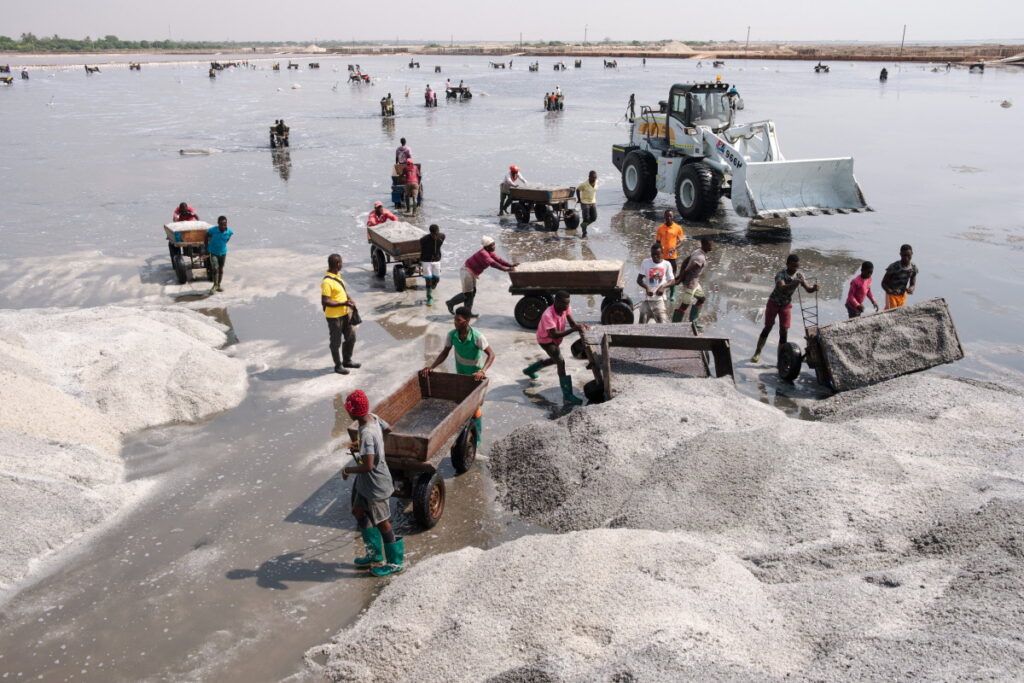Ghana’s salt industry, long touted for its potential, is set for a transformative breakthrough that could add up to $1 billion in foreign exchange earnings annually by 2028.
The industry, which has seen modest production of around 250,000 metric tons of salt annually over the past decade, is now on the brink of unprecedented growth, driven by Electrochem Ltd.’s significant investment in the Songor Lagoon.
The company aims to increase annual production from the Songor enclave to 1.5 million metric tons over the next four years.
Electrochem, a Ghanaian-owned company backed by the McDan Group, currently holds the largest concession for salt mining in the Songor Lagoon.
According to documents, the company projects a 400,000 metric ton production target by 2025, with revenues hitting $350-400 million. By 2028, Electrochem plans to ramp up production to 1.5 million metric tons annually, which would potentially bring in over $1 billion in foreign exchange earnings.
For decades, salt production in Ghana has been largely artisanal, limited by rudimentary techniques and heavy dependence on favorable weather. With the Songor Lagoon’s vast salt reserves, the potential for industrial-scale production has been a recurring conversation. Yet, the sector has been held back by conflicts over land use, community resistance, and a lack of investment.
Electrochem’s involvement marks the beginning of a shift. The company is investing $100 million to modernize salt production, employing advanced solar evaporation techniques and infrastructure improvements.
These efforts have already expanded the usable area of the lagoon for salt production from 7 square kilometers to 72 square kilometers, according to satellite images.
“Before Electrochem, we only had a fraction of the lagoon filled with brine. Now, with their investment, we can see how much potential the lagoon truly has,” a local leader in Ada remarked.
While the future looks bright for the salt industry, Electrochem’s operations have not been without controversy. The concession granted to the company, covering over 39,000 acres, sparked tensions with local artisanal miners and community leaders.
Many feared that industrialization would alienate local workers, disrupt traditional practices, and erode the cultural significance of the lagoon.
In response, Electrochem has emphasized a community-first approach. The company has signed Memorandums of Understanding (MOUs) with local chiefs and clans to ensure that communities will benefit directly from the enriched brine and infrastructure upgrades. Electrochem also plans to create over 5,000 direct jobs, with an additional 12,000 jobs in artisanal salt mining and related industries.
“We understand the deep cultural and spiritual connection the people of Ada have with the lagoon. That’s why we’re working hand-in-hand with community leaders to ensure that everyone benefits from this transformation,” said the Electrochem representative.
The potential for Ghana’s salt industry extends beyond local economic growth. Currently, Ghana’s salt exports amount to a modest $4.36 million, or 0.022% of the country’s total export earnings. By 2028, salt could contribute 5% of Ghana’s exports, diversifying the country’s revenue streams and boosting its balance of trade.
“The global salt market is expected to grow to $48 billion by 2030. Ghana has a unique opportunity to capitalize on this growth, especially as the demand for salt in industrial applications and green energy continues to rise,” noted a report by IMANI Africa.
Electrochem’s success will be closely watched by policymakers and investors alike, as the company moves toward a potential listing on the Ghana Stock Exchange.
Without investment, the salt industry in Ghana has remained stagnant, with the majority of workers trapped in poverty. With this project, Ghana can leverage its natural resources to drive industrialization, create jobs, and significantly increase foreign exchange earnings.
As the salt industry moves toward full industrialization, the key challenge will be ensuring that communities, investors, and the environment all benefit from the resource’s vast potential. The blueprint for the Songor Lagoon could serve as a model for similar projects across the country.
With the right regulatory framework and continued investment, Ghana has the potential to become Africa’s leading salt producer. The future of the salt industry holds great promise for the nation, its people, and its economy.
As one local resident put it, “For the first time in decades, it feels like the salt in the Songor Lagoon can be more than just our heritage — it can be our future.”




